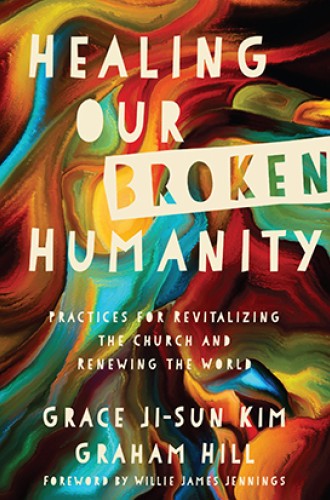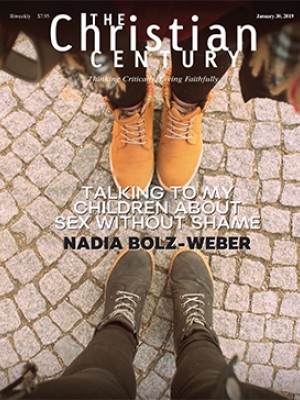Pragmatic guidance for the task of healing the world
Grace Ji-Sun Kim and Graham Hill challenge churches to embrace nine practices of active faith.
As a pastor I look for practical resources that cross the theological spectrum, stimulate discussion, and compel me to act. Grace Ji-Sun Kim and Graham Hill offer just such a resource. The task of “healing our broken humanity” is ambitious, but Kim and Hill offer pragmatic guidance for those who wish to undertake it.
With the idea of God creating “one new humanity” (Eph. 2:15) as their compass, the authors explore nine practices that can assist in such healing. They argue that “the church needs fresh practices before a watching world”—practices like relinquishing power, renewing lament, reconciling relationships, and reimagining the meaning of church. I found two of these practices particularly helpful: repenting together and reactivating hospitality.
Read our latest issue or browse back issues.
The chapter on repentance begins with the claim that “our world is plagued by the pursuit of power and control, and by injustices, exploitations and racial disparities.” The authors make it clear that these sins are both personal and social. Repentance is a necessary posture in the face of such reality. It is a “four stage process” that involves conviction, contrition, commitment, and change.
Kim and Hill confront the racism and sexism embedded in our culture, calling the church away from an ideology of patriotism and national exceptionalism and toward allegiance to God. Naming “sanctioned violence” and the embrace of individualism as additional sins that require repentance, the authors call readers toward a new humanity in Christ—one that “believes in community, interdependence, compassion and love.”
A community that repents together calls its people to act for justice. Kim shares the story of taking two of her classes to the United States–Mexico border through an organization called Borderlinks. Her students were able to witness the hardship migrants face as they seek to enter the United States. This experience engaged the students in the possibility of changing their posture and helped them to become humbler in their faith.
Kim and Hill highlight the United Nations report Displacement: The New 21st Century Challenge. With almost 50 million people in 2012 forcibly displaced worldwide, how shall Christians respond? “In a word: hospitality.” The course will be challenging, the authors acknowledge. The way is not easy. And yet it “makes us fuller, richer, more Christ-like people.”
Hill describes what hospitality might look like as a central mission for the church. For example, flags from various countries surround the walls of Parkside Baptist Church in Sydney, Australia.
In this community that gathers people from more than 50 linguistic, cultural, and ethnic backgrounds, 40 percent of the families are first-generation migrants. Programs that offer opportunities to serve Sydney’s poorest communities bring the congregation into the “Messiah’s love for all the peoples of the world.”
Kim and Hill envision a new humanity that “embraces the diversity of the body of Christ.” The church around the world, they argue, has the opportunity to seek the oneness that Jesus embodied without being “tokenistic.” Churches that strive for this unity will grow in “cultural intelligence among their leadership and in their congregations,” an intelligence that leads to “a new narrative and a new way of telling our stories of God in our lives.”
It can be a risk to write this kind of book, fraught with the possibility of getting lost in justice jargon, political rants, or pietistic pragmatism. The authors generally stay close to their theme of a new humanity. They combine thoughtful research with wisdom seasoned by experience. Their critique of ecclesial culture is aimed at encouraging readers to press on with active faith.
Accordingly, each chapter contains “practices, challenges and activities for small groups,” which act as invitations to do something beyond enjoying the book as an intellectual exercise. An appendix with questions for reflection and action helps bring together theological dialogue and cultural analysis. Another appendix offers an online resource for individual and small group work around accountability in relationships, which is one of the book’s underlying themes.
Living into a new humanity in Christ requires intentional practice. It is God’s work in Christ, and we have been summoned to pursue it. Kim and Hill are helpful companions for the way.






